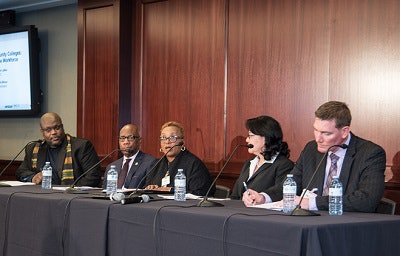WASHINGTON – America’s tech industry needs greater diversity, equity and inclusion, and achieving those goals depends in large part on the ability of educational institutions, governments, and philanthropies to work collaboratively and consistently.
That was a key point made during panels and keynote speeches Tuesday at “Building a Diverse and Skilled Tech Workforce,” an event presented by Verizon Foundation and the National Association for Community College Entrepreneurship (NACCE).
There’s a need to diversify not just corporate offices, but the ranks of venture capitalists and other tech entrepreneurs who contribute to job creation, wealth development and upward social mobility, speakers said.
And, they added, pipelines must be expanded and multiplied to educate, hire and retain minority and other underrepresented students from community colleges, historically Black colleges and universities, Hispanic serving institutions, tribal colleges and other minority serving institutions who are talented but face opportunity barriers.
“Diversity and inclusion are more than just buzzwords,” U.S. Rep. Alma Adams, D-NC, said in keynote remarks. “They are crucial to our economic progress and should be a way of life for the workforce.”
A former professor at Bennett College – a private all-women’s HBCU in her state – and a founder and co-chair of the Congressional Bipartisan HBCU Caucus, Adams noted a long history of HBCUs producing a large proportion of Black STEM graduates and said support for their viability must be part of any serious discussion about diversifying the tech industry.
“HBCU sustainability and a diverse workforce go hand in hand,” said Adams. “If diversity is a priority, strengthening HBCU’s should be a priority. Diversity and inclusion are not possible without the input of HBCU’s. Talent is universal but opportunity is not. It’s time to recognize the undertapped potential of HBCU’s and make up for a century of under-investment.”
She called for greater equity in the allocation of federal funds and urged the private sector to back up talk with action.
“Starting the dialogue is not enough,” she said.
Adams said diversity and equity are important not just for upward social mobility and building generational wealth on a personal level, but to maintain the nation‘s global competitiveness, a theme echoed by U.S. Rep. Raul Grijalva, D-Az., in his keynote remarks.
The nation is culturally diversifying, a reality that will not change, so it makes sense to focus on investing more in adequately preparing the generations that will lead the nation into a different future, said Grijalva, a member of the House Education and Labor Committee.
“This is not a time to divert funding from education,” he said, citing the value of postsecondary education and disparities in degree-attainment in areas from race to students of foster care. “Education is an opportunity-equalizer.”
Debt-free college and robust investment in community colleges and MSIs of all kinds can help eliminate disparities and ensure that students from underrepresented groups access, persist in, and advance after college in tech and other fields, Grijalva said.
“A diverse workforce is critical to our country,” he said. “It begins to close the gap between the haves and have-nots. Diversity fosters innovation and creativity and brings workers together from all walks of life. It improves the sustainability of our country. To close disparities and turn equality into equity, then we must make investments. And the dividends will pay off for all.”
Community colleges are playing an increasingly pivotal role in expanding the pipeline toward tech industry diversity, NACCE president and CEO Dr. Rebecca Corbin said in a fireside chat with Rose Stuckey Kirk, Verizon’s chief corporate social responsibility officer.
Although some find it challenging, particularly engaging students at rural community colleges and HBCUs, “it’s never been more important to think about diversity” and the positive impact it can have on the workplace, Corbin said.
She recommended strategies such as engaging girls and other underrepresented students in middle school, bolstering their critical-thinking skills, providing mentoring and wrap-around services, creating public and private partnerships and helping students visualize themselves in tech roles to pique their interest.
Tech companies must be committed to going beyond their conventional recruiting practices at predominantly White institutions, said Morgan State University president Dr. David Wilson during a panel discussion about HBCUs.
“We can’t have a genuine conversation about diversifying tech if HBCUs and Hispanic serving institutions and Native American serving institutions and all the minority serving institutions are not driving this conversation,” he said.
Those institutions, he added, know how to find, educate and motivate underrepresented students “and don’t need a research study to tell us how to do it.”
Raquel Tamez, CEO of the Society of Hispanic Professional Engineers, said the systemic problem of minorities being underrepresented in the tech industry requires systemwide solutions, and one of them is to hold accountable managers who make hiring decisions.
And that goes beyond bias training and tokenism, Tamez said during a panel discussion about recruiting, developing and supporting diverse workers, innovators and entrepreneurs. She said the tech industry has received a diversity “wake-up call,” and more companies should follow the lead of companies such as Intel in achieving employment equity.
Fractured efforts involving institutions, business, government and other stakeholders need to become more cooperative, she said.
“And we need to diversify diversity,” she added. “We need to make diversity more inclusive. Because there are the haves and the have-nots in diversity. Organizations should be more intentional about inclusiveness. If we’re not intentionally including, we’re unintentionally excluding.”
LaMont Jones can be reached at [email protected]. You can follow him on Twitter @DrLaMontJones


















